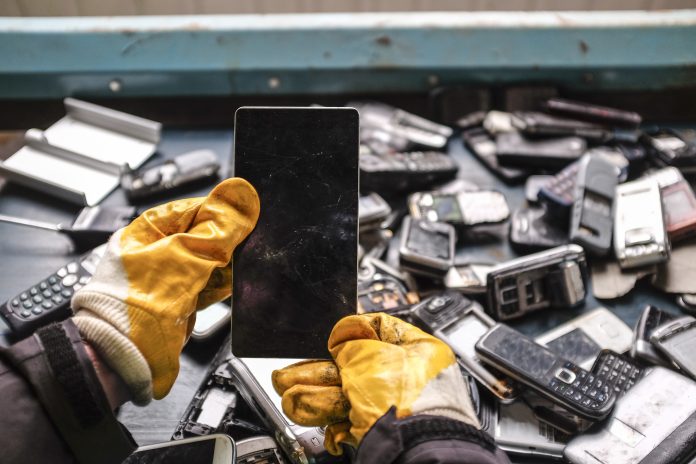Blockchain can enable more efficient and environmentally friendly recycling programs, ensuring that electronic waste is disposed of properly
According to the United Nations, electronic waste has become the world’s fastest-growing domestic waste stream, with approximately 53.6 million metric tons generated in 2019 alone.
Mobile devices have become an essential part of our lives, and whilst almost every person in the world over the age of 14 already has one, the industry is still on track to sell 1.5 billion smartphones this year.
Smartphones are the largest consumer product category ever created and the first $1tn category; however, increasing demand for new devices has contributed to a significant environmental problem – electronic waste.
The mobile phone industry is one of the major contributors, with most of the environmental impact occurring before a new device is even taken out of its box.
The production of a smartphone makes emissions of up to 85 kilograms of CO2
According to GSMA, the production of a single smartphone can result in emissions of up to 85 kilograms of carbon dioxide equivalent (CO2e), whilst a used device creates only 10 kilograms.
Furthermore, a study from Accenture found extending the lifespan of a mobile phone from 18 months to four years could result in a 40% reduction in CO2e emissions; a longer lifespan means fewer new phones need to be produced, thereby reducing emissions from manufacturing, transportation and disposal.
Extending the lifespan of a mobile phone from 18 months to four years could result in a 40% reduction in CO2e emissions
At the Mobile World Congress 2023 (MWC), one of the main topics amongst industry leaders was how the mobile industry could create a circular economy for devices, extending their lifespan and reducing waste.
These discussions covered topics such as sustainable mobile devices, incentives for second-life devices, supply and demand challenges and the importance of collaboration in creating a more circular economy.
All agreed that there was an urgent need for the mobile industry to move from a take-make-waste model to a circular, more sustainable approach.
Turning waste barriers into sustainable opportunities
However, several barriers would need to be overcome to make this a reality:
- Standardization: Each manufacturer currently uses its own proprietary systems and software, making it difficult to track a phone’s history and ownership.
- Consumer behaviour: Many consumers still prefer to buy new devices rather than used ones, even if they are more expensive. Increasing awareness of the environmental impact of their purchasing decisions and incentivising them to choose used devices would be crucial to the success of this initiative.
- Trust: Consumers mistrust the value and performance of second-hand devices; from repair history to battery performance and age – the limited information available about used devices makes this an unattractive and unworkable option.
No one industry player has a clear process to satisfy these barriers, and as a result, new devices are purchased, often when a good quality used device would more than meet the customers’ needs.

The role of blockchain technology
One critical way to address these concerns is through blockchain technology, which could track the lifecycle of a device, including its manufacturing, distribution, ownership and disposal. Creating a secure and immutable record of a device’s history would increase consumer trust and adoption of used devices and enable their sale at higher prices.
Furthermore, by tracking the lifecycle of a device, it’s possible to streamline refurbishment, recycling and resell processes, leading to faster turnaround times and lower costs. These efficiency savings would present more opportunities for global carriers, OEMs, companies and individuals to participate in the circular economy.
That said, this approach is not without its challenges; the technology is still relatively new and untested on a large scale and finding ways to make the process, which is very energy-intensive, more energy-efficient, is critical.
Regulation, integration, education and collaboration
There are several requirements, both technical and operational, that would need to be implemented to enable blockchain in the mobile industry;
- Regulation: The government would need to create a regulatory framework for the traceability of devices, ensuring that the data collected was secure and privacy compliant
- Integration: Mobile carriers and retailers would need to integrate blockchain technology into their existing systems to create a seamless and transparent experience for customers
- Education: Consumers would need to be educated about the benefits of buying and selling used devices and educated on how blockchain provides a higher level of security and trust
- Collaboration: Frameworks would need to be implemented to ensure that the data collected is secure and privacy compliant. These would require investment from OEMs and carriers and would be crucial to assist in building consumer trust
Creating a joint OEM-carrier-funded model to invest in the tech, its framework and control could be the quick solution to bringing this model to life over the coming years.
Far-reaching potential for reducing electronic waste
The implementation of blockchain-enabled traceability for used smartphones has the potential to make a significant impact on reducing electronic waste in the mobile industry.
For customers, buying a used device with a blockchain-verified history provides greater confidence in the quality and authenticity of the product.
The ability to sell a used device at a higher price also incentivises customers to take better care of their devices
The ability to sell a used device at a higher price also incentivises customers to take better care of their devices, leading to a longer device lifespan and reducing the environmental impact. For mobile carriers, retailers, and other players in the industry, there are potential new business opportunities to be explored.
Additionally, blockchain can enable more efficient and environmentally friendly recycling programs, ensuring that electronic waste is disposed of properly. Furthermore, device tracing could see carriers and OEMs increasing profitability significantly with quicker turnarounds in device refurbishment, repair and logistics.
For blockchain to be successful in the mobile industry, the government, mobile carriers, retailers, and consumers need to work together to create a regulatory framework and integrate this technology into their existing systems. Doing so will reduce electronic waste, extend the life span of mobile devices and create a more sustainable tomorrow for all.
This piece was written and provided by Hastings Singh, Chief Customer Officer, Kingfisher.











